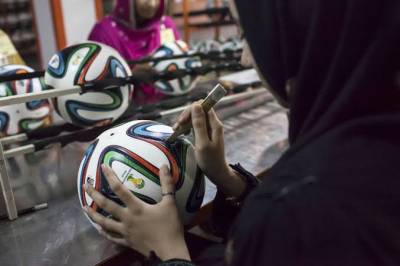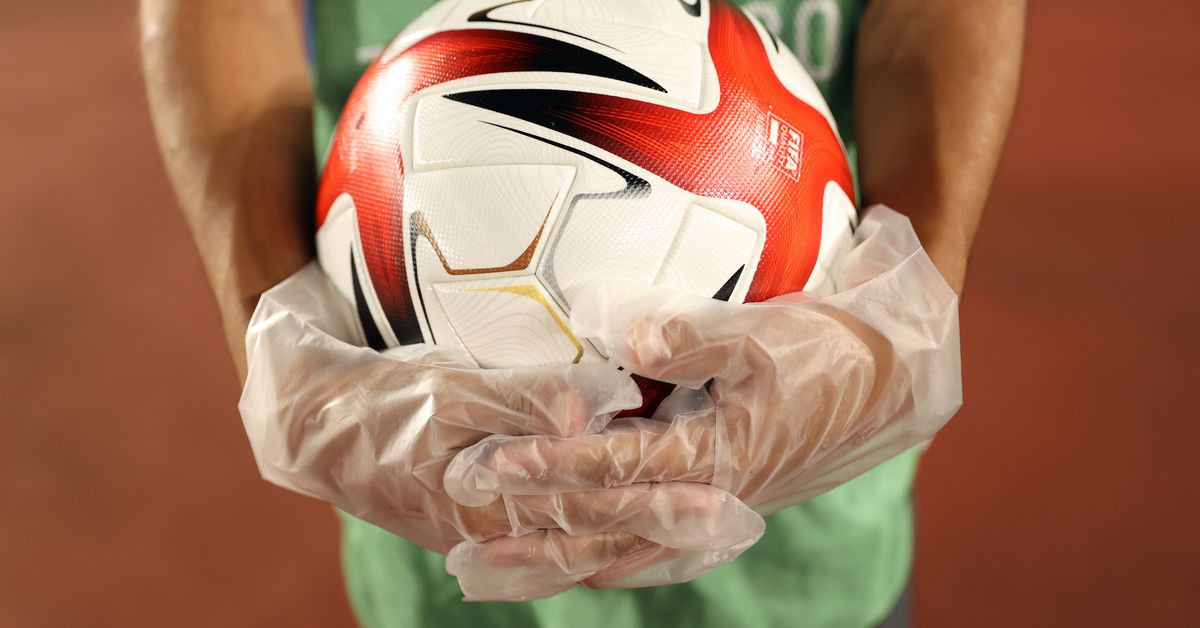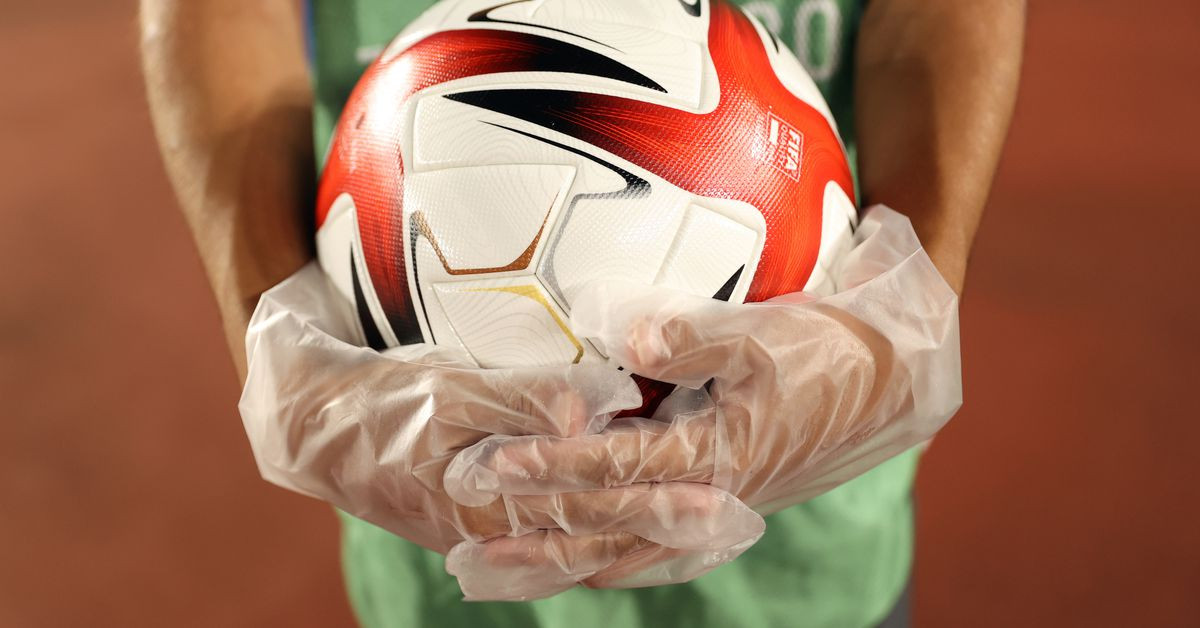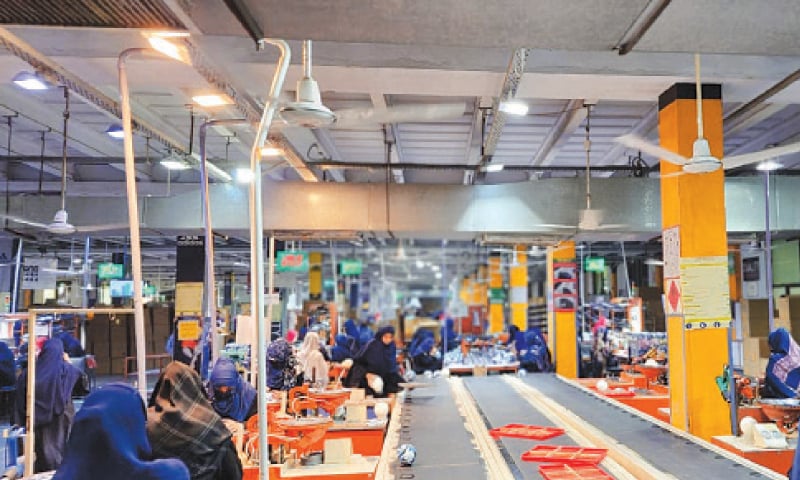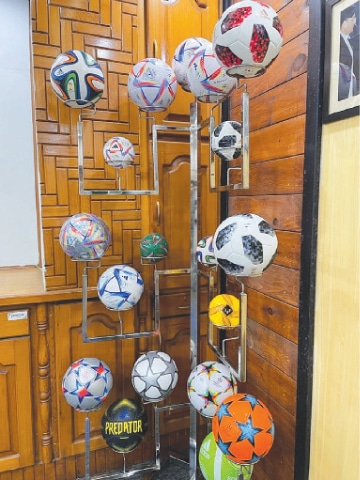.,.,
Mariam Tahir
October 19, 2022
Women make up a sizeable number of the workforce in football manufacturing units around Sialkot and Forward Sports is no exception.—Photo by the writer
With mere weeks to go before the first kick-off at Qatar 2022, football fever is upon us all. But while a Pakistan squad has never been part of the competition, the country is represented at nearly every major soccer game in the world — by the balls themselves.
Like the ‘Tel Star 18’ in 2018 and the ‘Brazuca’ in 2014, this year’s Fifa World Cup will also be played exclusively with the Al Rihila.
“We make sure to give our hundred percent to every single ball, but when it comes to the football World Cup, the level of dedication is something else,” explains an assembly line inspector at Forward Sports, the factory in Sialkot that manufactures these balls.
Smartly dressed women positioned around an expansive assembly line are busy stitching, cutting and putting the finishing touches on specimens of the now world-famous match ball.
Although this is the third consecutive Fifa World Cup that Forward Sports is catering to, this is perhaps the first occasion that the product that will be kicked around by the likes of Ronaldo and Messi come November will be a truly ‘made in Pakistan’ product.
Forward Sports CEO Khawaja Masood Akhtar explains that unlike the last two outings, when the official ball was co-produced with China, this time his company is the exclusive manufacturer of the match balls. This is no mean feat, considering how ubiquitous the ‘made in China’ tag has become, thanks to their legendary manufacturing prowess.
Mr Akhtar views this as a testament to the company’s commitment to “innovation, automation and efficiency coupled with untiring research and development”.
In his words, their greatest advantage is cheap labour. “But labour will only get you so far if efficient systems are not place,” he says.
Founded in 1991, Forward Sports has been working with Adidas since the mid-1990s and claims to supply match balls to some of the world’s top football competitions, including the Champions League (since 2008), as well as the FIFA World Cup (since 2014).
A display of some of the balls supplied by the company to the world’s most prestigious football events, including the World Cup. —Photo by the writer
Specimens of balls that were used in past competitions are displayed in the corner of a meeting room, where a brief presentation details the various milestones and many national and international accolades the company has garnered over the years.
Despite the political uncertainty that clouds things on the national front, Mr Akhtar is nonplussed. “When all is said and done, the client is concerned only with their demands being met timely and efficiently,” he reasons.
“If we are able to provide them quality goods at competitive rates, the client isn’t too concerned with who the head of the state is.”
The company is driven by a desire “to stay one step ahead of the competition”, which is evidenced by the breakthrough technologies employed by them. The most celebrated of these is ‘thermo-bonding’, whereby football panels are glued together for a completely seamless finish, unlike traditional hand and machine-stitched balls.
The company also boasts a host of patents – most notably for eliminating the need for the ‘last manual stitch’, previously deemed mandatory to seal machine-stitched balls, as well as the Airless mini ball that never deflates and doesn’t need an air pump.
The company’s testing lab is also one of their most prized possessions, for it is here that technicians in lab coats subject footballs to various stringent durability and heat, humidity, mould and impact tests; all in a bid to ensure that the product going into the hands and feet of international footballers are of a befitting quality.
A tour of the factory reveals that assembling a modern football isn’t simply about needle and thread work anymore — the craft that originally put Sialkot on the map.
“In this day and age, it is not just necessary but essential to do away with the old and make way for the new. In the past, we were dependent on the individual kaarigar (artisan). Now, it is the machine, nay the whole system, which servers as a karigar,” Mr Akhtar explains.
Small wonder, then, that they are able to produce around a million balls a month and successfully meet the demands of their growing customer base, even on “impossibly short notice”.
Published in Dawn, October 19th, 2022
